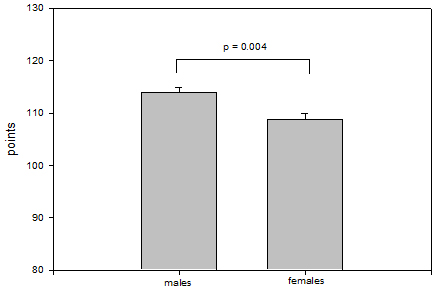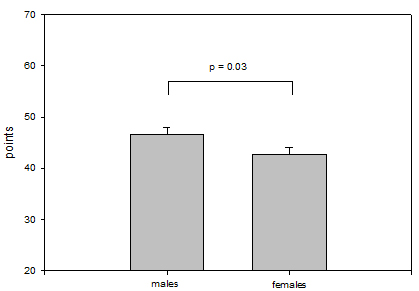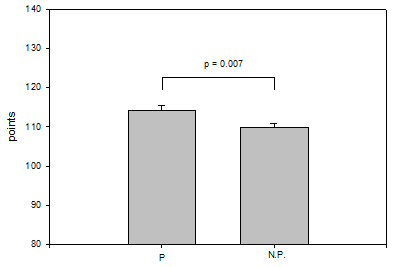Abstract:
Women and men differ in many aspects of life; among these, their view of sport activities differ considerably. Thus, football (soccer) and the prediction of football results are recurrent sources of stress. Despite this, until now no study has investigated the parameters affecting football expertise in detail. We performed two prospective observation studies in health care employees to investigate whether football expertise, as a parameter combining behavioural, social, and physical aspects of life, is related to gender or anthropometric parameters.
The first study was performed in 2004 during the UEFA European Cup in Portugal. In order to confirm the results of the initial study, a second study was performed during the FIFA World Cup 2006 in Germany. A total of 307 persons were included in the studies. All volunteers had to predict the results of the preliminary round of the respective tournament. An evaluation of the results was done by scores, which were given for correct tendency and correct numbers of goals for each team.
In the first study, a significant difference between male and female participants was found (46.7 ± 1.3 pts, n=41 f: 42.7 ± 1.4 pts, n=42; p = 0.03). This was confirmed in the second study, which had a total of 224 participants. Here, male participants scored significantly higher than female participants (m: 113.9 ± 1.0 pts; f: 108.7 ± 1.3pts; p = 0.004). This difference remained significant in both studies after adjustment for age, profession, and BMI. Despite the fact that the majority of “couch potatoes” are supposed to be outstanding football experts, no relation between BMI and the ability to predict football results was found.
We demonstrated that men perform better in predicting football results than women. This finding was confirmed in a second independent cohort. The consequences of this apparent discrepancy between these gender specific realities on men’s health and the question of whether advertisement and television increasingly favour promoting women as football experts remain to be determined.
Introduction:
Football (soccer) expertise depends on psychological, social, and physiological factors. Despite the apparent impact of this topic on daily life, no study has investigated the parameters affecting football expertise in detail until now. In particular, the question of whether gender is important for individual football expertise is recurrent, due to a lack of valid studies and often irrational debate. Initially, football was dominated on and beside the football field by males. The classical roles were described; the male was the football expert, who rarely played football himself, watched football on TV, and liked to analyse previous games. On the other hand, women tried to avoid watching football games if possible and judged it simply as a sport with twenty-two men running for one ball. Therefore, discussions between males and females about this topic have been often dominated by males.
In recent years, this picture has changed remarkably. Apart from a considerable number of female football players and increasing interest by the media for professional female football, an increasing number of female football supporters have been registered (Member Statistics 2005 German Football Association). This has resulted in changes in the typical behavioural roles in relation to football. Indeed, football discussions often result in quarrels. These discussions are often passionate and lack rational bases. Taking all this together, there is certainly a considerable chauvinism in terms of supposed football expertise. Whether this is justified is completely unclear.
Therefore, we performed the first study to investigate whether football expertise, as a parameter combining behavioural, social, and physical aspects of life, is related to gender. Since men and women are apparently different in aspects potentially influencing football expertise, among them anthropometry and social status, we included these parameters in our multivariate analysis.
Methods:
The first study was performed in 2004 during the UEFA European Cup in Portugal. Participants for this study were recruited by e-mail and personal communication at the Charité-University Medical School Berlin and the German Institute of Human Nutrition. A total of eighty-three volunteers were recruited. Apart from personal information, all participants had to predict the results of the preliminary round. In total, there were twenty-four games.
To confirm the results of the initial study, a second study (study II) was performed during the 2006 FIFA World Cup in Germany. Participants of this study were recruited by Internet and intranet from the Charité-Medical School Berlin. Two hundred and forty-one persons agreed to participate in this study. However, due to missing data, seventeen individuals had to be excluded from final analysis so that a total of 224 persons were ultimately included in this study. All volunteers had to predict the results of the preliminary round of the FIFA World Cup 2006. In total, there were forty-eight games. Baseline characteristics of the volunteers of both studies are presented in Table 1. Additional questions about profession and occupational localization were asked.
Table 1: Baseline characteristics of volunteers in Study I and Study II. P-values for reached points were adjusted for BMI, age, profession, and workplace.
A) Study I: UEFA EC 2004
| Males | Females | p-value | |
| Participants | 41 | 42 | – |
| Points | 46.7 ± 1.3 | 42.7 ± 1.4 | 0.03 |
| BMI (kg/m2) | 23.3 ± 0.7 | 22.5 ± 0.5 | 0.34 |
| Age (y) | 32.2 ± 1.2 | 34.5 ± 1.6 | 0.25 |
B) Study II: FIFA WC 2006
| Males | Females | p-value | |
| Participants | 132 | 92 | – |
| Points | 113.9 ± 1.0 | 108.7 ± 1.3 | 0.004 |
| BMI (kg/m2) | 23.7 ± 0.2 | 22.2 ± 0.4 | 0.001 |
| Age (y) | 35.0 ± 0.7 | 36.6 ± 1.0 | 0.18 |
A total of 307 persons were included. An evaluation of the results was done by scores given for correct tendency and correct numbers of goals for each team. For correct tendency, three points were given and for correct number of goals for one team, one point was given. In one game, a maximum of five points could be achieved.
Statistics:
Statistical calculations were performed with SPSS 12.0 (SPSS Inc., Chicago, IL, USA). All values are given as mean ± standard error. Unpaired T-test was applied if parameters were normally distributed, otherwise Mann-Whitney-U test was used. Multivariate analysis was performed by General Linear Model procedure. Correlations between variables were investigated by Pearsons coefficient of correlation. An alpha-error below 5% was considered to be statistically significant.
Results:
In Study I during the 2004 EC in Portugal, a significant difference between males and females was found in eighty-three individuals (m: 46.7 ± 1.3 pts, f: 42.7 ± 1.4 pts; p = 0.03). This result was confirmed in Study II, which had a total of 224 participants. Here, male participants scored significantly higher than female participants (m: 113.9 ± 1.0 pts; f: 108.7 ± 1.3 pts; p = 0.004).
We next speculated that differences in anthropometry might affect these results, given that “couch-potatoes” might score differently than lean and fit individuals. However, no significant correlation was found between BMI (2006: r = 0.061; p = 0.391; 2004: r = 0.001; p = 0.991) and football expertise (Figure 1) in either study. Correspondingly, the gender specific difference of football expertise remained significant in both studies after adjustment for age and BMI.
Figure 1: Males show higher football expertise compared to female participants in the studies. Results were adjusted for age, profession, and BMI.
Figure 1:
| a) FIFA WC 2006 | b) UEFA EC 2004 | |
 |
 |
While no significant differences between physicians and non-physicians could be observed in Study I, physicians had significantly more points than non-physicians in Study II (P: 114.3 ± 1.3 pts, N.P.: 110 ± 1.1 pts; p = 0.007, figure 2). In the WC 2006 study, a more detailed analysis on the influence of profession was performed. The analysis of working areas showed that neurologists and psychiatrists had the highest levels of football expertise, while the lowest results were achieved by the members of the departments of pediatrics (internal medicine: 111.1 ± 1.3 pts, neurology/psychiatry: 115.2 ± 2.6 pts, pediatrics: 109.8 ± 4.4 pts, surgical departments: 112.1 ± 3.2 pts, radiology: 112.1 ± 5.2 pts, others: 109.7 ± 2.3 pts, administration: 111.3 ± 3.2 pts). Although apparently of considerable interest, none of these differences reached statistical significance. We additionally tested whether profession or workplace affected the relation between gender and football expertise. Although profession had a significant influence in Study II (p = 0.03), the gender-specific difference remained significant in both cohorts.
Subsequently, the relation between professional experience and football experience was tested in physicians. Although senior registrars had significantly more points than all other groups, especially the directors of the clinics (directors: 111.5 ± 9.7 pts, senior registrars: 118.6 ± 2.6 pts, SHO: 113.0 ± 1.5 pts, care staff: 109.3 ± 2.3 pts, scientist: 110.6 ± 1.6 pts, administration: 108.8 ± 3.2 pts, technicians: 108.9 ± 3.3 pts, students: 113.8 ± 2.8 pts), these differences were not statistically significant.
Discussion:
We demonstrate that men predict football (soccer) results more accurately than women. Thus, the widespread chauvinism in terms of football expertise appears to be partially justified. However, it is important to note that gender accounts for only about 5% of the variability of football expertise. Thus, additional, not-yet identified factors are apparently predominantly responsible for the individual football expertise.
Differences in health care between genders were recently acknowledged as important neglected points; these are part of the ongoing competition between men and women (1). The gender confrontation can also be found in the field of sports, which is not exclusive to the sport itself but includes parasportive activities (2). Football is among the most discussed topics, especially during globally communicated events like the recent FIFA World Cup (3;4). The classical role, which is also often presented by the media, characterises men as football experts, while women are neglected in that context. In recent years, this picture has changed considerably. Women are increasingly recognised as a potential focus of advertisement in the environment of sport events. Consequently, more and more women are presented as experts, i.e. in television broadcasts, which clearly challanges the classical role of the man being the football expert.
Our results indicate that in the general population, men are still better qualified to predict football results than women. Thus, any overemphasis with respect to women in that context is in contrast to the existing reality. The health consequences of such undeserved discrimination are unclear, but may finally result in inferiority complexes or aggression in men, which remains to be determined. Some points of the study design should be mentioned. The presented data are based on healthcare workers and it is unclear whether they can be transferred to the general population. In addition, the ability to predict football results is unlikely to represent the whole spectrum of football expertise. Another important topic addressed here was the relation between anthropometry and football expertise. Although no direct association with BMI was found, a relation to abdominal obesity cannot be excluded. However, “couch potatoes,” who are likely to perform pretty well in football results prediction, are characterised by abdominal obesity, rather than simply elevated BMI. In addition, only about 20% of the cohorts had a BMI higher than 25 kg/m2. Thus, the study may have been underpowered to address this question sufficiently.
Figure 2: Physicians (P) in Study II (n=224) show a significantly higher football expertise than non-physicians (N.P.). Results are after adjustment for age, sex, and BMI.
Figure 2:

In summary, we demonstrated that men perform better in predicting football results than women. This finding was confirmed in a second independent cohort. The consequences on men’s health due to the apparent discrepancy between gender specific realities and the fact that advertisement and television increasingly favour women as football experts remain to be determined.
References:
Carroll D., S. Ebrahim, K. Tilling, J. Macleod, G.D. Smith. Admissions for myocardial infarction and World Cup football: Database survey. BMJ 2002; 325(7378):1439-1442.
Collin J., R. MacKenzie. The World Cup, sport sponsorship, and health. Lancet 2006; 367(9527):1964-1966.
Doyal L. Sex, gender, and health: The need for a new approach. BMJ 2001; 323(7320):1061-1063.
Tanaka H. The battle of the sexes in sports. Lancet 2002; 360(9326):92.

